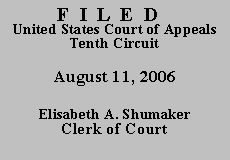

| FRED F. FRANZONE,
v.
BILL OWENS, Governor, et al.;
JOHN SUTHERS, the Attorney
General of the State of Colorado |
|
Mr. Franzone was convicted, following a jury trial, on August 30, 1998, of (1) endangering public transportation, and (2) menacing. R. Doc. 3, attach. He was sentenced to a five years on count 1 and two years on count 2, to run concurrently with count 1, "plus any terms of parole authorized by CRS 18-1-105(1)(A)(V)." He served four years in prison, was paroled, and then was returned to prison after a parole violation. In his habeas petition, Mr. Franzone challenges the mandatory parole term on several grounds. On appeal, he raises several more issues.
It appears that Mr. Franzone had a state direct appeal, with certiorari denied on December 20, 1999. He also sought relief under Colo. R. App. P. 21, and those resulted in denials on July 6, 2003 and August 24, 2005. He also lists three post-conviction proceedings under Colo. R. Crim. P. 35. R. Doc. 3 at 4.
To obtain a COA, Mr. Franzone must make a substantial showing of the denial of a constitutional right. 28 U.S.C. § 2253(c)(2). "When the district court denies a habeas petition on procedural grounds without reaching the prisoner's underlying constitutional claim, a COA should issue when the prisoner shows, at least, that jurists of reason would find it debatable whether the petition states a valid claim of the denial of a constitutional right and that jurists of reason would find it debatable whether the district court was correct in its procedural ruling." Slack v. McDaniel, 529 U.S. 473, 484 (2000).
After reviewing the record on appeal, we conclude that Mr. Franzone has failed to establish that the district court's ruling concerning exhaustion of the claims made in the petition is reasonably debatable. We agree with the district court that Mr. Franzone's efforts to utilize the original jurisdiction of the Colorado Supreme Court does not constitute "fair presentation" of his claims for purposes of exhaustion. See Castille v. Peoples, 489 U.S. 346, 351 (1989). Although Mr. Franzone also argues that he filed three Rule 35 motions in 2000, his petition does not indicate that this claim was included, but regardless, he would not have complete exhaustion having failed to appeal. He provides no rationale as to why exhaustion might not apply. Although we construe pro se petitions liberally, the pro se petitioner has the burden of providing the relevant facts, particularly where the district court raised the exhaustion issue. See Hall v. Bellmon, 935 F.2d 1106, 1110 (10th Cir. 1991).
We DENY the COA, DENY leave to proceed IFP, and DISMISS the appeal.
Entered for the Court
Paul J. Kelly, Jr.
Circuit Judge